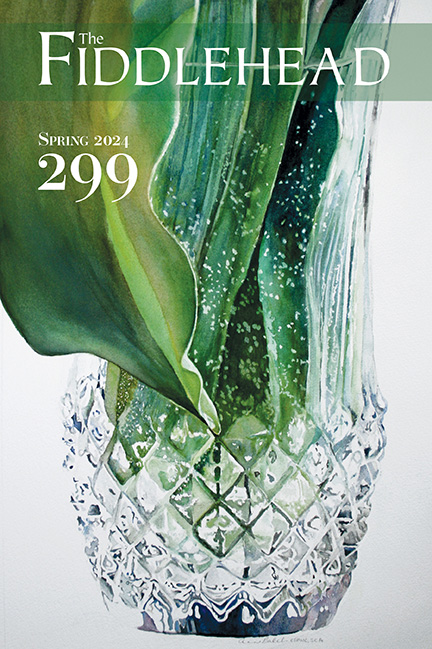
Love as a Driving Force by Manahil Bandukwala
A Dream Wants Waking, Lydia Kwa. Wolsak & Wynn, 2023
Lydia Kwa’s A Dream Wants Waking promises a dreamlike narrative through its title and cover, and the short novel certainly delivers. The book opens with a list of characters from the past timeline in Tang China from 644-904 CE and the present timeline of Luoyang in 2219 CE. Told through short chapters that switch back and forth at a rapid pace, Kwa immediately immerses the reader into both timelines of the story.
While A Dream Wants Waking is a continuation of Kwa’s previous novels Oracle Bone and The Walking Boy, there isn’t a need to read the other novels to grasp the narrative of this one — the previous two novels are set in the “past” timeline that makes up half of A Dream Wants Waking, but the perspective of this novel is from 2219 CE. The book is fast-paced and, like a dream, leaps from timeline to timeline. Within the first few pages, Kwa takes us to 904 CE, and then to 2219 CE. She ties together the timelines, characters, and connections between past and present. The list of characters Kwa provides at the beginning of the novel, dividing the timelines in which characters appear, is helpful to refer to as the narrative unfolds.
Kwa’s blend of Chinese mythology and science fiction is incredibly striking. The novel begins with two foxes, a mother and a daughter, in conversation about reincarnation. Here, the mother-fox says, “Nobody tells us to reincarnate; it’s not inevitable.”The daughter fox responds, “We return because we have a wish to complete something we couldn’t do in a previous life. Love compels us to do more” (7). At the outset, Kwa lays out the driving force for the main characters. We keep this idea of love as a force of reincarnation in our minds as the narrative progresses to introduce the reincarnated main character, Yinhe.
Yinhe is a half-human, half-fox spirit. She lives with her father, and is estranged from her mother, a grief that Kwa explores as the narrative unfolds. We don’t actually meet Yinhe until a couple of chapters into the novel. After the reader gets a glimpse at her past life, she “wakes up from her dream drenched from head to toe. She was standing next to Ling in the dream, in her previous incarnation as Qilan” (14). The book’s title is infused into the poetic narratives Kwa weaves. The very act of reading this book feels dreamlike. Kwa’s lyrical prose had me read A Dream Wants Waking the way I would read a book of poetry, allowing myself to be stunned and moved by evocative descriptions. When describing Yinhe’s travel between past and present, Kwa writes: “[Yinhe is] back on the ancient road between Chang’an and Luoyang more than thirteen hundred years ago. She can hear the exiles’ voices singing as they trek away from Chang’an and toward the unknowns of a new life in Luoyang. Yinhe sings the melody now, in a whisper” (103). The use of song here brought me onto the page and next to Yinhe on her journey.
Although part of the novel is set in the 23rd century, the setting feels eerily similar to the present with the looming presence of Artificial Intelligence that watches over the people. Early in the novel, Kwa writes, “Do not ignore myths — they contain great wisdom” (28). This line feels like a note of wisdom and warning to the reader as much as it does to the characters.
Similarly, in the second section of the novel, she writes: “Learn to not be attached to your family and friends. Detachment is the path to liberation” (97). These words are declared in the name of the Spirit Supreme, but once again they ring too close in our own individualistic society. In this way, Kwa accomplishes what speculative fiction does best: she gives us a pulled-back look at our present. The past and future are never that distinct, nor are they as far away as we are led to believe. Yet, within this world, Kwa also infuses hope. No.1, a chimeric brain, requests recognition of the personhood of experiment subjects: “She is a movement, a pulse, a physical presence whose entire being they sense” (113).
In all incarnations, whether human or mythological or scientific, relationships form the heart of this book. In this way, the novel circles back to the notion of love as a driving force, and as an antithesis to an individualistic society. This is a lesson that exists not only in A Dream Wants Waking, but as a mantra we can carry beyond the pages of the book. “Life is palpably tenuous yet tender” (142). This is a line Yinhe utters as the novel approaches its climax. At this point in the book, Kwa lays out one shattered relationship, while simultaneously giving us another that is full of love and tenderness. Even the non-sentient seek to understand love, and to have love as part of their lives. While the way love appears might not be the same as what was in a previous incarnation, love is nonetheless present and powerful.
Kwa leans into a narrative of strangeness and treats the surreal as commonplace. A Dream Wants Waking is a novel that requires your attention to fully understand, but the reward for doing so is great.
— Manahil Bandukwala is the author of MONUMENT (Brick Books, 2022) and Heliotropia (Brick Books, 2024), and the co-author of Women Wide Awake (Mawenzi House, 2023).











